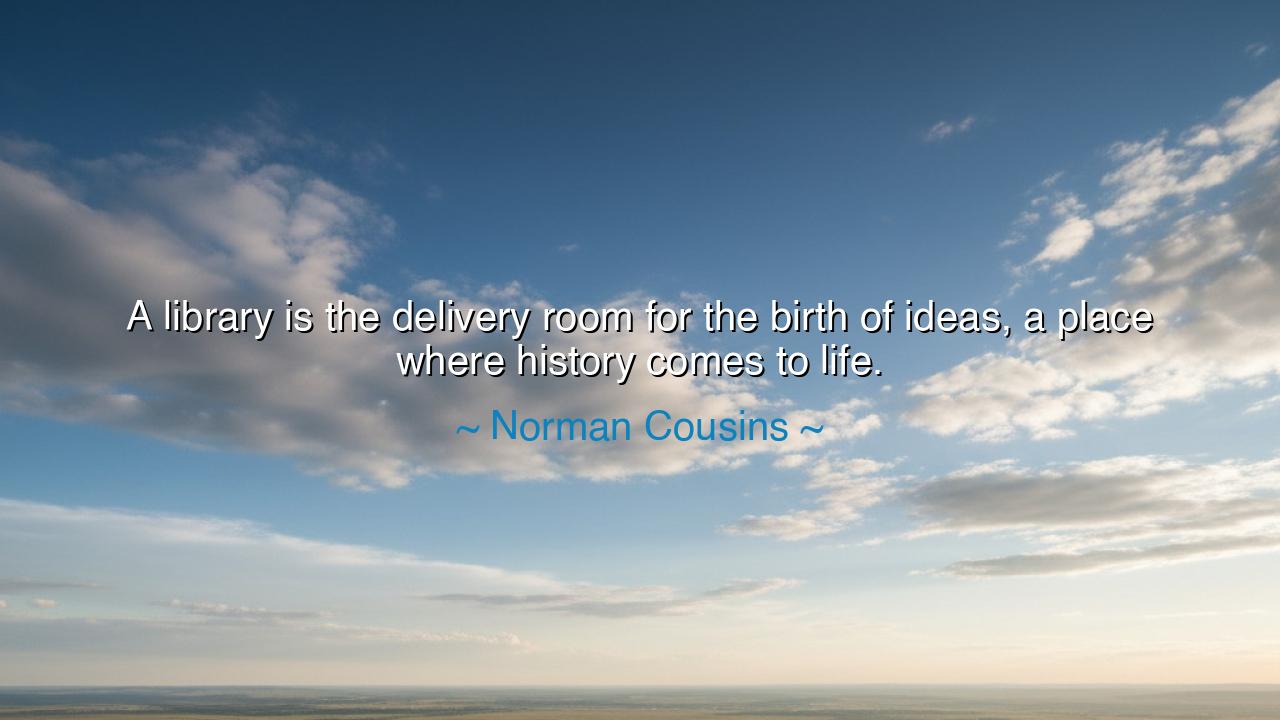
A library is the delivery room for the birth of ideas, a place
A library is the delivery room for the birth of ideas, a place where history comes to life.






“A library is the delivery room for the birth of ideas, a place where history comes to life.” — Norman Cousins
Listen, O seekers of truth and keepers of knowledge, to the words of Norman Cousins, a man who believed that the human spirit finds its immortality not in monuments of stone, but in words, thought, and imagination. In this sacred saying, he likens the library — that humble house of silence and wisdom — to a delivery room, where ideas are born, where the labor of countless minds throughout the ages brings forth the new light of understanding. To him, books are not relics of the past, but living seeds, ready to burst into life in the mind of every reader who dares to open them. In every corner of a library, history breathes, the dead speak again, and ideas long buried rise like springtime from the soil of time.
The origin of this insight lies in Cousins’ lifelong devotion to peace, healing, and the power of the human intellect. A journalist, editor, and humanitarian, he lived through the great upheavals of the twentieth century — two world wars, the atomic age, and the dawn of global communication. He saw firsthand how ignorance breeds conflict, but also how knowledge restores hope. To Cousins, the library was not merely a collection of books; it was a temple of civilization, where the mind of humanity stores its memory and its dreams. He called it a “delivery room” because within those quiet walls, the birth of ideas is constant — every page turned, every mind engaged, every question asked is a new beginning for truth itself.
When Cousins says that the library is where history comes to life, he speaks of the mystery of human continuity. In those shelves lie the voices of the ancients — Plato, Confucius, Hypatia, Frederick Douglass, Virginia Woolf — their words still alive, their wisdom still speaking to us across centuries. When we read, we are not merely learning about history; we are participating in it. The past does not rest quietly in the pages; it rises, vibrant and immediate, as we breathe the same thoughts that once ignited revolutions, healed hearts, and redefined the world. Every library is a bridge between generations, where the living and the dead labor together to shape the unborn future.
Consider the story of Alexandria, the ancient city that once held the greatest library the world had ever known. It was said that within its walls lay the accumulated wisdom of every known civilization — the writings of philosophers, poets, mathematicians, and physicians. There, ideas mingled like rivers meeting in a vast sea. Scholars came from across the earth to study, to argue, to discover. But when that library burned, a light went out in the ancient world. Humanity learned then what Cousins later put into words: that the library is not a storage of paper, but a womb of progress. Its destruction was not merely the loss of books — it was the loss of thousands of unborn ideas, the silencing of future voices. Yet from that tragedy came a lesson eternal: that knowledge must be protected, and that from the ashes of one library, another must always rise.
And so, in every age, the library has stood as a sanctuary against forgetfulness. In times of tyranny, it preserves the words of the free. In times of despair, it keeps the promise of renewal. The Nazis burned books to erase memory; scholars and citizens risked their lives to hide them. The Taliban and other zealots sought to destroy art and history; yet always, somewhere, someone saved a single page, a single story, from the fire. For even the smallest scrap of knowledge can rekindle the flame of civilization. The library, therefore, is not only a place — it is a defiance of oblivion.
Cousins understood, too, that libraries are not only guardians of the old but midwives of the new. Each reader who enters becomes part of that sacred cycle — reading, questioning, and creating in turn. Within its walls, the child who first opens a book may grow into the thinker who reshapes the world. The birth of ideas does not happen in laboratories alone, nor in the courts of kings, but in the quiet communion between a reader and a page. A library is not silent; it hums with the whisper of countless voices saying, “You are not alone — think, and you will live forever.”
So take this as your lesson, O wanderer of the modern world: enter the library as one enters a temple. Do not hurry. Walk softly, for you tread among the dreams of the dead and the destinies of the living. When you open a book, know that you are assisting at the birth of an idea, that you are present in the eternal delivery room of thought. Read with reverence, but also with courage — for ideas, once born, demand action. Let the words of the past shape your deeds in the present, that future generations may inherit not ignorance, but light. And remember always, as Norman Cousins taught, that in the library, the miracle of creation never ceases — it is there that humanity gives birth to itself, again and again, through the power of the written word.






AAdministratorAdministrator
Welcome, honored guests. Please leave a comment, we will respond soon